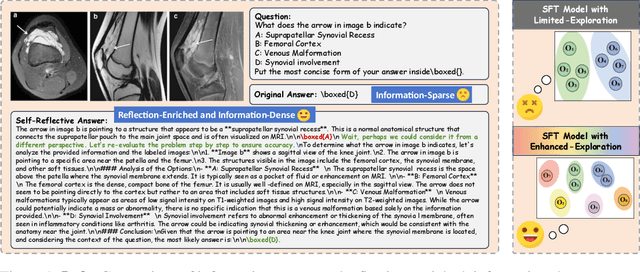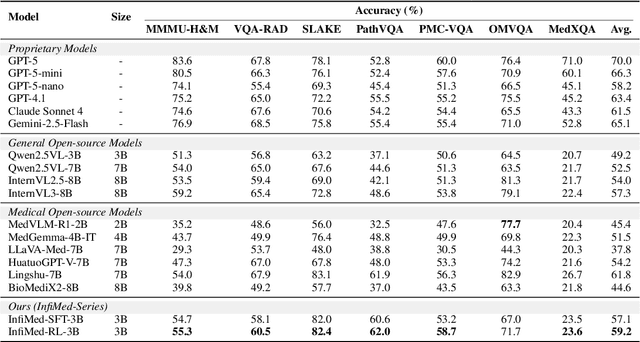Congkai Xie
InfiR2: A Comprehensive FP8 Training Recipe for Reasoning-Enhanced Language Models
Sep 26, 2025



Abstract:The immense computational cost of training Large Language Models (LLMs) presents a major barrier to innovation. While FP8 training offers a promising solution with significant theoretical efficiency gains, its widespread adoption has been hindered by the lack of a comprehensive, open-source training recipe. To bridge this gap, we introduce an end-to-end FP8 training recipe that seamlessly integrates continual pre-training and supervised fine-tuning. Our methodology employs a fine-grained, hybrid-granularity quantization strategy to maintain numerical fidelity while maximizing computational efficiency. Through extensive experiments, including the continue pre-training of models on a 160B-token corpus, we demonstrate that our recipe is not only remarkably stable but also essentially lossless, achieving performance on par with the BF16 baseline across a suite of reasoning benchmarks. Crucially, this is achieved with substantial efficiency improvements, including up to a 22% reduction in training time, a 14% decrease in peak memory usage, and a 19% increase in throughput. Our results establish FP8 as a practical and robust alternative to BF16, and we will release the accompanying code to further democratize large-scale model training.
InfiMed-Foundation: Pioneering Advanced Multimodal Medical Models with Compute-Efficient Pre-Training and Multi-Stage Fine-Tuning
Sep 26, 2025



Abstract:Multimodal large language models (MLLMs) have shown remarkable potential in various domains, yet their application in the medical field is hindered by several challenges. General-purpose MLLMs often lack the specialized knowledge required for medical tasks, leading to uncertain or hallucinatory responses. Knowledge distillation from advanced models struggles to capture domain-specific expertise in radiology and pharmacology. Additionally, the computational cost of continual pretraining with large-scale medical data poses significant efficiency challenges. To address these issues, we propose InfiMed-Foundation-1.7B and InfiMed-Foundation-4B, two medical-specific MLLMs designed to deliver state-of-the-art performance in medical applications. We combined high-quality general-purpose and medical multimodal data and proposed a novel five-dimensional quality assessment framework to curate high-quality multimodal medical datasets. We employ low-to-high image resolution and multimodal sequence packing to enhance training efficiency, enabling the integration of extensive medical data. Furthermore, a three-stage supervised fine-tuning process ensures effective knowledge extraction for complex medical tasks. Evaluated on the MedEvalKit framework, InfiMed-Foundation-1.7B outperforms Qwen2.5VL-3B, while InfiMed-Foundation-4B surpasses HuatuoGPT-V-7B and MedGemma-27B-IT, demonstrating superior performance in medical visual question answering and diagnostic tasks. By addressing key challenges in data quality, training efficiency, and domain-specific knowledge extraction, our work paves the way for more reliable and effective AI-driven solutions in healthcare. InfiMed-Foundation-4B model is available at \href{https://huggingface.co/InfiX-ai/InfiMed-Foundation-4B}{InfiMed-Foundation-4B}.
InfiAlign: A Scalable and Sample-Efficient Framework for Aligning LLMs to Enhance Reasoning Capabilities
Aug 07, 2025



Abstract:Large language models (LLMs) have exhibited impressive reasoning abilities on a wide range of complex tasks. However, enhancing these capabilities through post-training remains resource intensive, particularly in terms of data and computational cost. Although recent efforts have sought to improve sample efficiency through selective data curation, existing methods often rely on heuristic or task-specific strategies that hinder scalability. In this work, we introduce InfiAlign, a scalable and sample-efficient post-training framework that integrates supervised fine-tuning (SFT) with Direct Preference Optimization (DPO) to align LLMs for enhanced reasoning. At the core of InfiAlign is a robust data selection pipeline that automatically curates high-quality alignment data from open-source reasoning datasets using multidimensional quality metrics. This pipeline enables significant performance gains while drastically reducing data requirements and remains extensible to new data sources. When applied to the Qwen2.5-Math-7B-Base model, our SFT model achieves performance on par with DeepSeek-R1-Distill-Qwen-7B, while using only approximately 12% of the training data, and demonstrates strong generalization across diverse reasoning tasks. Additional improvements are obtained through the application of DPO, with particularly notable gains in mathematical reasoning tasks. The model achieves an average improvement of 3.89% on AIME 24/25 benchmarks. Our results highlight the effectiveness of combining principled data selection with full-stage post-training, offering a practical solution for aligning large reasoning models in a scalable and data-efficient manner. The model checkpoints are available at https://huggingface.co/InfiX-ai/InfiAlign-Qwen-7B-SFT.
Infi-Med: Low-Resource Medical MLLMs with Robust Reasoning Evaluation
May 29, 2025



Abstract:Multimodal large language models (MLLMs) have demonstrated promising prospects in healthcare, particularly for addressing complex medical tasks, supporting multidisciplinary treatment (MDT), and enabling personalized precision medicine. However, their practical deployment faces critical challenges in resource efficiency, diagnostic accuracy, clinical considerations, and ethical privacy. To address these limitations, we propose Infi-Med, a comprehensive framework for medical MLLMs that introduces three key innovations: (1) a resource-efficient approach through curating and constructing high-quality supervised fine-tuning (SFT) datasets with minimal sample requirements, with a forward-looking design that extends to both pretraining and posttraining phases; (2) enhanced multimodal reasoning capabilities for cross-modal integration and clinical task understanding; and (3) a systematic evaluation system that assesses model performance across medical modalities and task types. Our experiments demonstrate that Infi-Med achieves state-of-the-art (SOTA) performance in general medical reasoning while maintaining rapid adaptability to clinical scenarios. The framework establishes a solid foundation for deploying MLLMs in real-world healthcare settings by balancing model effectiveness with operational constraints.
Infi-MMR: Curriculum-based Unlocking Multimodal Reasoning via Phased Reinforcement Learning in Multimodal Small Language Models
May 29, 2025



Abstract:Recent advancements in large language models (LLMs) have demonstrated substantial progress in reasoning capabilities, such as DeepSeek-R1, which leverages rule-based reinforcement learning to enhance logical reasoning significantly. However, extending these achievements to multimodal large language models (MLLMs) presents critical challenges, which are frequently more pronounced for Multimodal Small Language Models (MSLMs) given their typically weaker foundational reasoning abilities: (1) the scarcity of high-quality multimodal reasoning datasets, (2) the degradation of reasoning capabilities due to the integration of visual processing, and (3) the risk that direct application of reinforcement learning may produce complex yet incorrect reasoning processes. To address these challenges, we design a novel framework Infi-MMR to systematically unlock the reasoning potential of MSLMs through a curriculum of three carefully structured phases and propose our multimodal reasoning model Infi-MMR-3B. The first phase, Foundational Reasoning Activation, leverages high-quality textual reasoning datasets to activate and strengthen the model's logical reasoning capabilities. The second phase, Cross-Modal Reasoning Adaptation, utilizes caption-augmented multimodal data to facilitate the progressive transfer of reasoning skills to multimodal contexts. The third phase, Multimodal Reasoning Enhancement, employs curated, caption-free multimodal data to mitigate linguistic biases and promote robust cross-modal reasoning. Infi-MMR-3B achieves both state-of-the-art multimodal math reasoning ability (43.68% on MathVerse testmini, 27.04% on MathVision test, and 21.33% on OlympiadBench) and general reasoning ability (67.2% on MathVista testmini).
InfiJanice: Joint Analysis and In-situ Correction Engine for Quantization-Induced Math Degradation in Large Language Models
May 16, 2025



Abstract:Large Language Models (LLMs) have demonstrated impressive performance on complex reasoning benchmarks such as GSM8K, MATH, and AIME. However, the substantial computational demands of these tasks pose significant challenges for real-world deployment. Model quantization has emerged as a promising approach to reduce memory footprint and inference latency by representing weights and activations with lower bit-widths. In this work, we conduct a comprehensive study of mainstream quantization methods(e.g., AWQ, GPTQ, SmoothQuant) on the most popular open-sourced models (e.g., Qwen2.5, LLaMA3 series), and reveal that quantization can degrade mathematical reasoning accuracy by up to 69.81%. To better understand this degradation, we develop an automated assignment and judgment pipeline that qualitatively categorizes failures into four error types and quantitatively identifies the most impacted reasoning capabilities. Building on these findings, we employ an automated data-curation pipeline to construct a compact "Silver Bullet" datasets. Training a quantized model on as few as 332 carefully selected examples for just 3-5 minutes on a single GPU is enough to restore its reasoning accuracy to match that of the full-precision baseline.
InfiGUI-R1: Advancing Multimodal GUI Agents from Reactive Actors to Deliberative Reasoners
Apr 19, 2025Abstract:Multimodal Large Language Models (MLLMs) have powered Graphical User Interface (GUI) Agents, showing promise in automating tasks on computing devices. Recent works have begun exploring reasoning in GUI tasks with encouraging results. However, many current approaches rely on manually designed reasoning templates, which may result in reasoning that is not sufficiently robust and adaptive for complex GUI environments. Meanwhile, some existing agents continue to operate as Reactive Actors, relying primarily on implicit reasoning that may lack sufficient depth for GUI tasks demanding planning and error recovery. We argue that advancing these agents requires a shift from reactive acting towards acting based on deliberate reasoning. To facilitate this transformation, we introduce InfiGUI-R1, an MLLM-based GUI agent developed through our Actor2Reasoner framework, a reasoning-centric, two-stage training approach designed to progressively evolve agents from Reactive Actors to Deliberative Reasoners. The first stage, Reasoning Injection, focuses on establishing a basic reasoner. We employ Spatial Reasoning Distillation to transfer cross-modal spatial reasoning capabilities from teacher models to MLLMs through trajectories with explicit reasoning steps, enabling models to integrate GUI visual-spatial information with logical reasoning before action generation. The second stage, Deliberation Enhancement, refines the basic reasoner into a deliberative one using Reinforcement Learning. This stage introduces two approaches: Sub-goal Guidance, which rewards models for generating accurate intermediate sub-goals, and Error Recovery Scenario Construction, which creates failure-and-recovery training scenarios from identified prone-to-error steps. Experimental results show InfiGUI-R1 achieves strong performance in GUI grounding and trajectory tasks. Resources at https://github.com/Reallm-Labs/InfiGUI-R1.
InfiR : Crafting Effective Small Language Models and Multimodal Small Language Models in Reasoning
Feb 17, 2025



Abstract:Large Language Models (LLMs) and Multimodal Large Language Models (MLLMs) have made significant advancements in reasoning capabilities. However, they still face challenges such as high computational demands and privacy concerns. This paper focuses on developing efficient Small Language Models (SLMs) and Multimodal Small Language Models (MSLMs) that retain competitive reasoning abilities. We introduce a novel training pipeline that enhances reasoning capabilities and facilitates deployment on edge devices, achieving state-of-the-art performance while minimizing development costs. \InfR~ aims to advance AI systems by improving reasoning, reducing adoption barriers, and addressing privacy concerns through smaller model sizes. Resources are available at https://github. com/Reallm-Labs/InfiR.
InfiGUIAgent: A Multimodal Generalist GUI Agent with Native Reasoning and Reflection
Jan 08, 2025Abstract:Graphical User Interface (GUI) Agents, powered by multimodal large language models (MLLMs), have shown great potential for task automation on computing devices such as computers and mobile phones. However, existing agents face challenges in multi-step reasoning and reliance on textual annotations, limiting their effectiveness. We introduce \textit{InfiGUIAgent}, an MLLM-based GUI Agent trained with a two-stage supervised fine-tuning pipeline. Stage 1 enhances fundamental skills such as GUI understanding and grounding, while Stage 2 integrates hierarchical reasoning and expectation-reflection reasoning skills using synthesized data to enable native reasoning abilities of the agents. \textit{InfiGUIAgent} achieves competitive performance on several GUI benchmarks, highlighting the impact of native reasoning skills in enhancing GUI interaction for automation tasks. Resources are available at \url{https://github.com/Reallm-Labs/InfiGUIAgent}.
 Add to Chrome
Add to Chrome Add to Firefox
Add to Firefox Add to Edge
Add to Edge